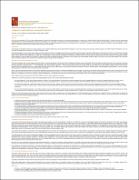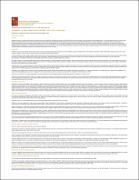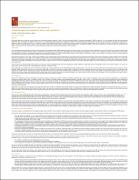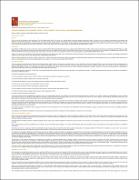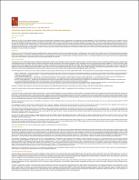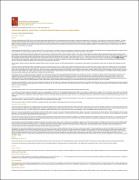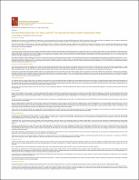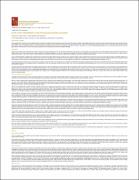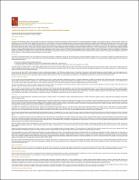Browsing Journal Articles (Health) by Issue Date
Now showing items 21-40 of 217
-
From Alma Ata to Millennium Development Goals: To What Extent Has Equity Been Achieved?
(Uganda Martyrs University, Department of Health Sciences, 2004-04)Equity was a core value in the Alma Ata declaration on PHC. However, the interpretation of equity varied and its application became difficult. Equity goals and objectives have often been rhetoric rather than practical. ... -
Community Participation: An Abused Concept?
(Uganda Martyrs University, Department of Health Sciences, 2004-04)One of the main principles of PHC was community participation. However, the interpretation and practices of community participation are so diverse that it became different things to different people. The lessons from the ... -
Primary Health Care and Sector-Wide Approaches
(Uganda Martyrs University, Department of Health Sciences, 2004-04)Primary Health Care and Sector-Wide Approaches to health development are among the major health sector reforms that have been undertaken in Uganda aimed at building a strong and cohesive health system. Inevitably, these ... -
Autonomy of Apex Hospitals in Uganda: Too Little, Too Slow
(Uganda Martyrs University, Department of Health Sciences, 2004-04)Hospital Autonomy, a sustained and purposeful change to improve the efficiency, equity and effectiveness of the health sector has been initiated to improve publicly-owned hospitals which, in many developing countries, ... -
The Effort to Achieve the Millennium Development Goals in Uganda: Reaching for the Sky?
(Uganda Martyrs University, Department of Health Sciences, 2004-04)At the United Nations Millennium Summit in September 2000, world leaders placed development at the heart of the global agenda by adopting the Millennium Development Goals (MDGs). The Government of Uganda is a signatory to ... -
Antiretrovirals are Coming to Africa: Are you Ready?
(Uganda Martyrs University, Department of Health Sciences, 2004-04)International agencies are beginning a rapid scaling up of antiretroviral distribution programs in Africa. Some are particularly looking for "faith-based organizations" (FBOs) as partners. The new initiatives may offer ... -
Political Economy of Health with Reference to Primary Health Care
(Uganda Martyrs University, Department of Health Sciences, 2004-04)Politics and economics have dealt with resource allocation from time immemorial. However, the basis for resource allocation and sharing depend on the nature and type of politics and economics, which also depend on different ... -
Voting with their Feet: What Lessons Can be Leant From Increased Consumption of Public Services in Uganda?
(Uganda Martyrs University, Department of Health Sciences, 2004-04)Uganda is a long way off achieving its Millennium Development Goals (MDGs). Persistently high child and maternal mortality reflect to some extent the poor performance of the health sector. The poor health service performance ... -
The Millennium Development Goals: The Ultimate Test of Will and Determination
(Uganda Martyrs University, Department of Health Sciences, 2004-04)On the eve of the 3rd millennium, stock was taken of PHC and health sector reforms. The results of a shocking failure of previously advocated goals were evident. Therefore, a new set of goals and mechanisms were adopted ... -
Patenting Drugs From 1st January 2005: Implications and Problems
(Uganda Martyrs University, Department of Health Sciences, 2004-08)January the 1st 2005 is a very important deadline for the policy on patented drugs in developing countries: implementation of the agreement concerning paragraph 6 of the Doha Declaration is going to be put into practice, ... -
Agricultural Biotechnology for Developing Countries
(Uganda Martyrs University, Department of Health Sciences, 2004-08)The Food and Agriculture Organization of the United Nations, in "The State of Food and Agriculture 2003-04", examines the potential of agricultural biotechnology to address the current and future needs of the world's poor ... -
Continuing Medical Education: Lessons From Butambala Health Sub-District
(Uganda Martyrs University, Department of Health Sciences, 2004-08)Continuing medical education (CME) is one way of keeping health workers updated with the new developments and new insights in treatment and approaches to health issues. It also helps them remember what is forgotten. This ... -
Integrating Service Delivery in IDP Camps: The Case of Northern Uganda
(Uganda Martyrs University, Department of Health Sciences, 2004-08)The mid-north and parts of eastern Uganda are under siege from the LRA and poor health. There are about 1.6 million people displaced by the LRA living in squalid camps. In these camps, the IDPs are cramped in huts built ... -
The Northern Uganda War: The “Small Conflict” That Became the World’s Worst Humanitarian Crisis
(Uganda Martyrs University, Department of Health Sciences, 2004-08)Acholi land was once known as the breadbasket of Uganda, but it is now the poorest part of the country. More than 900,000 people (over 80%) in the districts of Gulu, Kitgum and Pader are displaced, living in camps and ... -
Planning Health Care For Internally Displaced Persons: Experiences in Uganda
(Uganda Martyrs University, Department of Health Sciences, 2004-08)A significant proportion of Ugandans have at one time or another been forced to flee their homes. In 1997 alone, point prevalence revealed that 2,000,000 persons were displaced and it is estimated that currently about 1.6 ... -
Delivering Health Care to IDPs: Experiences and Challenges in Katakwi District
(Uganda Martyrs University, Department of Health Sciences, 2004-08)There are two broad categories of IDPs in Katakwi district by cause; those displaced by the Karamojong rustlers and those displaced by the Lords Resistance Army (LRA) incursion. Sporadic Karamajong raids started over 50 ... -
The Role of Governments in Ending and Preventing Armed Conflicts
(Uganda Martyrs University, Department of Health Sciences, 2004-08)The war in northern Uganda is ending, or is it? The official Government position is that the war is practically over. And they have evidence for it. Rebel soldiers are surrendering in droves, and the Lord’s Resistance Army ... -
Malaria and DDT: Myths and Facts
(Uganda Martyrs University, Department of Health Sciences, 2004-08)Around the world, about 2,400 million people, in about 100 countries and territories, are still at risk of contracting Malaria. Between 300 and 500 million of them get the disease each year and between 1.1 and 2.7 million ... -
Is DDT Safe? Considering Its Use For Malaria Control in Uganda
(Uganda Martyrs University, Department of Health Sciences, 2004-08)The insecticide DDT has been very successfully used for many years in malaria control programmes around the world. We assess the validity of the allegations that DDT is harmful to human health and the environment and find ... -
Targeting IDPs with Food AID: WFP Assistance in Northern Uganda
(Uganda Martyrs University, Department of Health Sciences, 2004-08)The World Food Programme (WFP) is the United Nations (UN) agency responding to humanitarian emergencies by delivering food aid to vulnerable populations worldwide. The protracted insurgency in northern Uganda resulted in ...



